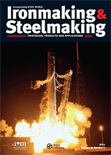
IRONMAKING & STEELMAKING
Scope & Guideline
Driving Excellence in Materials Science Research
Introduction
Aims and Scopes
- Ironmaking Processes:
Research on various ironmaking processes, including blast furnace operations, direct reduction of iron, and alternative methods such as hydrogen-based ironmaking, with a focus on efficiency and environmental impact. - Steel Production and Processing:
Studies related to steelmaking processes such as basic oxygen furnace (BOF) and electric arc furnace (EAF) technologies, including innovations in refining, casting, and rolling processes. - Materials Characterization and Properties:
Exploration of the physical and mechanical properties of various steel grades, including high-strength and specialty steels, with emphasis on microstructural analysis and metallurgical behavior. - Environmental Impact and Sustainability:
Research addressing the environmental aspects of iron and steel production, including emissions reduction, energy efficiency, and recycling of materials. - Computational Modeling and Simulation:
Use of computational techniques such as CFD (Computational Fluid Dynamics) and machine learning to model processes, predict outcomes, and optimize operations in ironmaking and steelmaking. - Inclusion and Defect Studies:
Investigation into non-metallic inclusions, defects in steel products, and their impact on mechanical properties, focusing on methods for controlling and improving steel cleanliness.
Trending and Emerging
- Sustainable Ironmaking Technologies:
There is a growing emphasis on sustainable processes, including hydrogen-based ironmaking and carbon capture technologies, reflecting the industry's response to climate change and environmental regulations. - Advanced Computational Techniques:
The integration of machine learning and AI in predicting steel properties and optimizing processes is becoming increasingly popular, indicating a trend towards data-driven decision-making in metallurgy. - High-Performance and Specialty Steels:
Research focused on the development of high-performance steels, including advanced high-strength steels (AHSS) and specialty alloys for specific applications, is on the rise. - Inclusion Control and Steel Cleanliness:
Emerging studies on the control of non-metallic inclusions and their impact on steel quality are gaining importance, as clean steel production becomes a critical focus for manufacturers. - Recycling and Circular Economy Practices:
Topics related to the recycling of materials and circular economy practices in steel production are increasingly being explored, highlighting the industry's commitment to resource efficiency.
Declining or Waning
- Traditional Methods of Ironmaking:
Research focused on conventional methods of ironmaking, such as older blast furnace technologies, seems to be declining in favor of more innovative and environmentally friendly processes. - Basic Steelmaking Techniques:
Studies centered around basic techniques in steelmaking, without integration of advanced technologies or sustainability aspects, are less frequently published, as the field moves towards more complex and efficient methodologies. - Historical Analysis of Steel Production:
Papers exploring historical methods and practices in ironmaking and steelmaking are becoming less common, as there is a stronger emphasis on current technologies and future advancements.
Similar Journals
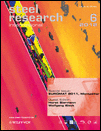
STEEL RESEARCH INTERNATIONAL
Advancing the Future of Metals and Alloys.STEEL RESEARCH INTERNATIONAL, published by WILEY-V C H VERLAG GMBH, is a premier journal that serves as a vital source of knowledge in the fields of condensed matter physics, materials chemistry, and metal and alloy research. With an ISSN of 1611-3683 and an E-ISSN of 1869-344X, this journal provides open access options that enhance its visibility and accessibility. Recognized for its scientific merit, it currently holds a Q2 ranking across multiple categories including Condensed Matter Physics and Materials Chemistry. This translates to an exceptional placement within the 64th percentile for Metals and Alloys and substantial recognition in other related fields according to Scopus rankings. By bridging theoretical concepts and practical applications, STEEL RESEARCH INTERNATIONAL aims to foster innovative research and dissemination of knowledge among researchers, professionals, and students focused on advancing the metallurgy and materials science domains. With a commitment to remain at the forefront of research from 2003 to 2024, the journal is poised to continue shaping the future of steel and alloy studies.

SPE Production & Operations
Exploring the Frontiers of Fuel TechnologySPE Production & Operations is a prestigious journal published by the Society of Petroleum Engineers (SPE), focusing on the critical domains of energy engineering and fuel technology. With an ISSN of 1930-1855 and an E-ISSN of 1930-1863, this journal has established itself as a vital resource in understanding the intricacies of production and operational practices within the petroleum sector. Its impressive Q2 ranking in both Energy Engineering and Power Technology, and Fuel Technology reflects its commitment to providing high-quality, impactful research. Spanning years from 2006 to 2023, SPE Production & Operations maintains an open access policy that ensures widespread dissemination of research findings, promoting knowledge sharing among industry professionals, researchers, and students alike. As the energy landscape continues to evolve, this journal serves as an essential platform for innovative research and discussion that addresses contemporary challenges and advancements in the field.
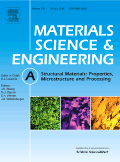
MATERIALS SCIENCE AND ENGINEERING A-STRUCTURAL MATERIALS PROPERTIES MICROSTRUCTURE AND PROCESSING
Unveiling the Secrets of Microstructure and ProcessingMATERIALS SCIENCE AND ENGINEERING A-STRUCTURAL MATERIALS PROPERTIES MICROSTRUCTURE AND PROCESSING, published by ELSEVIER SCIENCE SA, is a highly regarded journal specializing in the fundamental and applied aspects of materials science. Since its inception in 1988, this journal has established itself as a leading platform for disseminating innovative research findings, particularly focused on structural materials, their properties, microstructure, and processing techniques. With a prominent impact in the field, it ranks in the Q1 category across several disciplines including Condensed Matter Physics, Materials Science, Mechanical Engineering, and Nanoscience and Nanotechnology, highlighting its significance and influence within the academic community. The journal is accessible to a global audience of researchers, professionals, and students, underscoring its commitment to advancing knowledge in materials engineering. Aspiring authors and readers will find this journal an essential resource for cutting-edge research and the latest advancements in the field, further supported by its impressive Scopus rankings that place it among the top-tier publications.

Metals
Pioneering insights into the behavior and properties of metals.Metals is an esteemed open access journal published by MDPI, focusing on the diverse field of metallurgical science and its applications. Since its inception in 2011, the journal has provided a platform for the dissemination of high-quality research regarding the behavior, processing, and properties of metals and alloys. With an E-ISSN of 2075-4701, it has quickly established itself within the scientific community, achieving a remarkable Q1 ranking in the realm of Metals and Alloys and a Q2 rank in general Materials Science as of 2023. The journal is situated in Switzerland and is committed to the principles of open access, ensuring that findings are accessible to a broad audience without subscription barriers. With its notable impact factor and a strong emphasis on innovative research, Metals serves as an essential resource for researchers, professionals, and students seeking to advance their knowledge and understanding in the ever-evolving landscape of metallurgical studies.
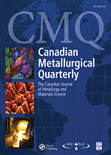
CANADIAN METALLURGICAL QUARTERLY
Unveiling Breakthroughs in Metals and Alloys.Canadian Metallurgical Quarterly is a prestigious scholarly journal published by Taylor & Francis Ltd, dedicated to the field of metallurgical engineering and materials science. With a rich history dating back to its inception in 1962 and continuing through its most recent publications, this journal serves as a vital platform for the dissemination of innovative research, advancements, and critical reviews in metallurgy, metals, and alloys. Positioned strategically within the academic community, it holds a significant impact factor and is currently rated in the Q2 category for Metals and Alloys, and Q3 in Industrial and Manufacturing Engineering as of 2023, showcasing its authoritative role in these disciplines. Although it does not offer open access, the journal remains widely recognized for its rigorous peer-review process, ensuring that published work adheres to the highest standards of scientific quality. Researchers, professionals, and students alike will find invaluable insights and contributions that drive the field forward.

Metallurgical Research & Technology
Exploring the forefront of materials science and engineering.Metallurgical Research & Technology is a distinguished journal published by EDP SCIENCES S A based in France, focusing on the dynamic field of metallurgical science and engineering. With a strong emphasis on the latest advancements in Materials Chemistry, Computational Mechanics, and Mechanics of Materials, this journal aims to provide a platform for researchers to share innovative findings that propel the field forward. As of 2023, it has secured a commendable position in various categories, including Q3 rankings in Computational Mechanics, Materials Chemistry, and Mechanics of Materials, along with a Q2 ranking in Metals and Alloys. The journal actively promotes open access, facilitating broader dissemination of critical research across the globe. Researchers, professionals, and students in the metallurgical domain will find Metallurgical Research & Technology an invaluable resource for cutting-edge developments and collaborative opportunities.

Acta Metallurgica Slovaca
Unlocking the potential of metals and alloys through open access.Acta Metallurgica Slovaca is a distinguished open-access journal published by SCICELL SRO that has been pivotal in the field of Materials Science and Metallurgy since its inception. With a robust commitment to disseminating high-quality research, this journal covers a wide array of topics within the scope of metals and alloys. Now indexed in Scopus, it ranks 82nd out of 176 in its category, reflecting a growing influence within the scientific community. With a quartile ranking of Q3 as of 2023, Acta Metallurgica Slovaca serves as an essential platform for researchers and professionals seeking to share innovative findings and developments in metallurgical science. Open access since 2013, it ensures that research is accessible to all, fostering collaboration and engagement across academia and industry worldwide. With a converged publication timeline extending from 2009 to 2024, this journal continues to play a crucial role in advancing knowledge and addressing contemporary challenges in the metallurgy sector.
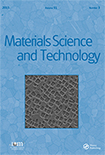
MATERIALS SCIENCE AND TECHNOLOGY
Innovative Discoveries Shaping the World of MaterialsMATERIALS SCIENCE AND TECHNOLOGY is a leading journal published by SAGE PUBLICATIONS INC, focusing on the interdisciplinary advancements in the field of materials science. Since its inception in 1984, the journal has provided a platform for researchers and industry professionals to present innovative findings through rigorous peer-reviewed articles. The journal holds a commendable impact factor and categorizes itself within the prestigious Q2 rank in various domains such as Condensed Matter Physics, Materials Science, Mechanical Engineering, and Mechanics of Materials according to the 2023 Quartiles. With no Open Access option, it primarily serves as a repository for in-depth studies and advancements that push the boundaries of materials engineering and application. Located in the United Kingdom, at 2455 TELLER RD, THOUSAND OAKS, CA 91320, the journal continues to attract a global readership, making it indispensable for academics, researchers, and students who aim to stay at the forefront of materials innovation.
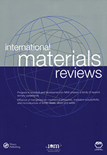
INTERNATIONAL MATERIALS REVIEWS
Unveiling Innovations in Metals and AlloysINTERNATIONAL MATERIALS REVIEWS, published by SAGE Publications Inc, is a leading journal dedicated to the comprehensive analysis of contemporary research in the fields of materials chemistry, mechanical engineering, mechanics of materials, and the study of metals and alloys. With an impressive impact factor and a Q1 ranking across multiple categories such as Materials Chemistry and Mechanical Engineering in 2023, it ranks amongst the top journals for innovative materials research. The journal has a long-standing history since its inception in 1987 and continues to serve as a crucial resource for academics and professionals alike. Although it is not open access, it is renowned for its rigorous peer-review process and its commitment to disseminating high-quality materials science research globally. Researchers, students, and industry professionals benefit greatly from the journal's insightful reviews, both for the advancement of theoretical knowledge and practical applications within the fast-evolving materials field.
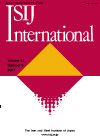
ISIJ INTERNATIONAL
Empowering Research in Metals and Alloys for a Sustainable FutureISIJ INTERNATIONAL is a distinguished open-access journal in the fields of Materials Chemistry, Mechanical Engineering, Mechanics of Materials, and Metals and Alloys, published by the esteemed IRON STEEL INST JAPAN KEIDANREN KAIKAN. Since its inception in 1986, ISIJ INTERNATIONAL has played a pivotal role in disseminating advanced research and critical findings in steel and iron industries, significantly contributing to innovations in materials science and engineering. With a commendable impact factor and categorized in Q2 quartiles across its relevant fields in 2023, the journal ranks favorably among other prestigious publications, evidencing its influence and relevance within the academic community. The journal promotes open access, allowing unrestricted online access to its published work since 2012, thus ensuring that researchers, professionals, and students can readily access cutting-edge research. The journal's comprehensive scope empowers researchers to connect over pioneering studies and methodologies that address contemporary challenges in materials and engineering domains, thereby fostering a rich dialogue and knowledge exchange.